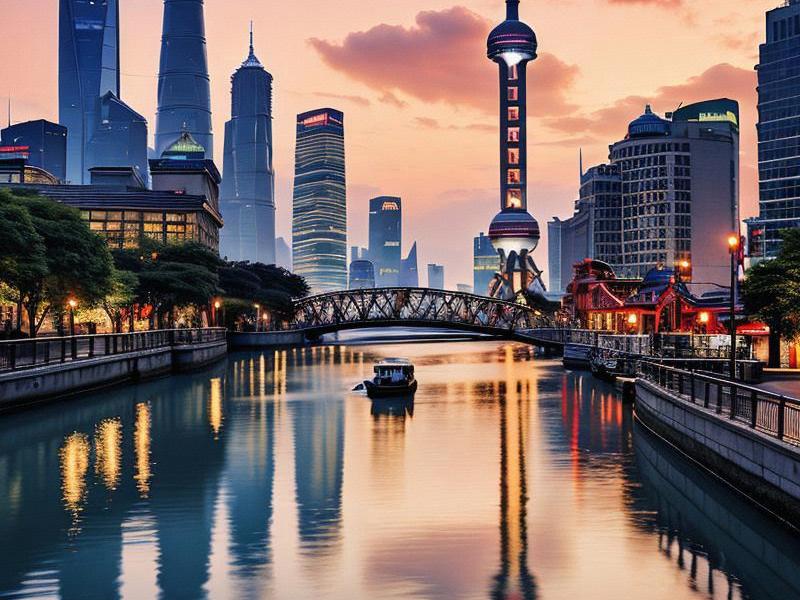Shanghai, the vibrant metropolis of China, stands as a beacon of modernity, innovation, and cultural richness. This article delves into the multifaceted aspects of Shanghai, exploring its economic prowess, cultural vibrancy, urban development, and its role as a global city.

Shanghai, often referred to as the "Pearl of the Orient," is a city that seamlessly blends the old with the new. It is the largest city in China and one of the most populous cities in the world, with a population exceeding 24 million. Situated on the eastern coast of China, Shanghai is not only a major financial hub but also a cultural and technological center, attracting millions of visitors and investors from around the globe.
The city's history dates back to the 11th century when it was a small fishing village. However, it was during the 19th century that Shanghai began to transform into a major port city, thanks to the signing of the Treaty of Nanking in 1842, which opened the city to foreign trade. This marked the beginning of Shanghai's rise as a cosmopolitan city, with a mix of Chinese and Western influences.
Economically, Shanghai is a powerhouse. It is home to the Shanghai Stock Exchange, one of the largest stock exchanges in the world, and the city's GDP ranks among the highest in China. The financial district of Lujiazui is a testament to Shanghai's economic might, with its iconic skyline featuring the Oriental Pearl Tower, the Jin Mao Tower, and the Shanghai World Financial Center.
Shanghai's economy has diversified over the years, moving beyond traditional manufacturing to include advanced manufacturing, high-tech industries, and services. The city is a leader in sectors such as finance, trade, shipping, and information technology. It is also a major hub for international companies, with numerous multinational corporations establishing their regional headquarters in Shanghai.
上海龙凤419杨浦
Culturally, Shanghai is a melting pot of traditions and modernity. The city boasts a rich history of art, literature, and architecture. The Bund, a historic waterfront area, showcases a blend of colonial-era buildings and modern skyscrapers, offering a glimpse into the city's past and present. The Yu Garden, a classical Chinese garden, provides a serene escape from the bustling city life.
Shanghai is also known for its vibrant arts scene. The city hosts numerous cultural festivals, art exhibitions, and theater performances throughout the year. The Shanghai International Film Festival is one of the most prestigious film festivals in Asia, attracting filmmakers and audiences from around the world. The city's museums, such as the Shanghai Museum and the Power Station of Art, showcase a wide range of artistic treasures, from ancient Chinese artifacts to contemporary art.
Urban development in Shanghai has been remarkable, with the city constantly evolving to meet the needs of its residents and visitors. The Maglev train, the world's fastest commercial train, connects Shanghai to the international airport, Pudong International Airport, in just 8 minutes. The city's extensive metro system provides efficient transportation, making it easy to navigate the sprawling metropolis.
上海贵族宝贝sh1314
Shanghai's skyline is a symbol of its rapid urbanization. The futuristic architecture of the Shanghai Tower, the tallest building in China and the second-tallest in the world, stands as a testament to the city's ambition and innovation. The city has also invested heavily in green initiatives, with parks, waterfront developments, and sustainable urban planning projects aimed at creating a more livable and environmentally friendly city.
Education is another area where Shanghai excels. The city is home to some of the top universities in China, including Fudan University and Tongji University, attracting students from across the country and abroad. Shanghai's education system is known for its emphasis on science, technology, engineering, and mathematics (STEM), preparing students for the challenges of the modern world.
Shanghai's role as a global city is further enhanced by its international connections. The city is a member of the Global Cities Network and the Asian Network of Major Cities 21. It hosts numerous international conferences, summits, and events, making it a key player in global affairs. Shanghai's free trade zone is a significant step towards China's integration into the global economy, promoting trade and investment.
上海品茶论坛
However, like any major city, Shanghai faces its challenges. The rapid urbanization has led to issues such as traffic congestion, air pollution, and housing shortages. The city government has implemented various measures to address these challenges, including the expansion of public transportation, the promotion of green energy, and the development of affordable housing.
Shanghai's future looks promising, with ongoing plans for further urban development and innovation. The city is committed to becoming a global leader in sustainability, smart cities, and digital transformation. The Shanghai Smart City initiative aims to integrate technology into all aspects of urban life, improving the quality of life for its residents.
In conclusion, Shanghai is a dynamic metropolis that embodies the spirit of China's modernization. Its economic strength, cultural richness, and urban development make it a city of global significance. As Shanghai continues to evolve, it remains a symbol of China's rise as a global power and a testament to the potential of urban centers in driving progress and innovation.